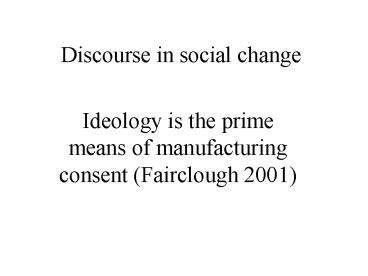Discourse in social change - PowerPoint PPT Presentation
1 / 16
Title:
Discourse in social change
Description:
Physical struggle (revolution, war, demonstrations, protests, elections) ... Ideological power (having power to legitimize and to naturalize) Discourse types ... – PowerPoint PPT presentation
Number of Views:21
Avg rating:3.0/5.0
Title: Discourse in social change
1
Discourse in social change
- Ideology is the prime means of manufacturing
consent (Fairclough 2001)
2
Text is ideologically creative
- Individual
- Commonsensical
- Related to ones position in society
- Develop knowledge about ourselves (technologies
of the self)
3
Discourse and social struggle
- Physical struggle (revolution, war,
demonstrations, protests, elections) - Ideological struggle in language
- Ideological power (having power to legitimize and
to naturalize)
4
Discourse types
- Ideologically particular or ideologically
variable (one position or another) - Determined by different economic and political
realities (elite and dominant block) - Naturalization and universality of discourses
(sustaining power in social institutions)
5
Alternative discourses
- Conscious (against dominant discourse)
- Oppositional (resistance)
- Marginal to political and economic dominance
6
Presentation of experiential values through words
- Coded in vocabulary
- Significance of ideology in words (subversive,
democratic forces, etc) - Example of the Contra war in Nicaragua freedom
fighters or murderers
7
Relations between words in discourse
- Ideologically contested
- Meaning depending on the discourse
- Depending on the relation of some words with
others (Evil Empire)
8
Contemporary capitalism is characterized by a
degree of colonization of peoples lives by
systems such as the economy and state
institutions in which discourse is the most
important tool
9
Two ways of colonization of peoples lives
- Consumerism(economy and commodity markets)
- Institutional control (bureaucracy, social order)
10
Social tendencies
- Imposed by the dominant block
- They change according to the change of these
tendencies - Discourse of consumerism re-structuring of other
discourse types - Strategic discourse
11
The dimensions of ideological work in advertising
- 1) The relationship advertising discourse
construct - between the producer/advertiser and the consumer
- 2) The way advertising discourse builds an
imagine - for the product (predicated on the ideology
(freedom, richness, efficiency, etc) - 3) The way it constructs subject positions
- for consumers
12
Cultural capitalism
- The process of industrialization and
- urbanization that has destroyed traditional
- cultural ties
- Traditional ties (extended families, religion
- or ethnic community) are replaced (ties of class)
13
How do advertising construct consumption
communities?
14
It does it indirectly
- Through ideology
- Superficial view of the relationship between
truth and fiction - Commons sense assumptions
15
Works ideologically through
- Building relations
- Building images
- Building the consumer
16
Discussion question
- Give me an example of a common sense assumption
in a power relationship. How can this common
sense assumption contribute to sustaining unequal
power relations?































